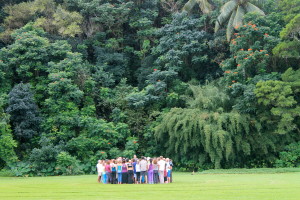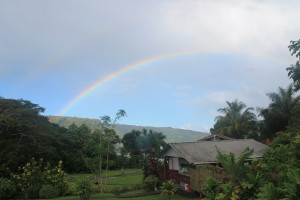
I am a dancer. There have been times in my life that it was my passion and it fed my spirit. Then I danced every day. I became a full-time elementary school teacher in my late 30’s. Shortly after I stopped dancing and left it behind.
But it wouldn’t leave me.
Throughout the years, I kept returning to my dance, finding new ways to check in with my body and spirit; a weekly stretch/strength/free dance class, NIA dance workshops and retreats, yoga, sacred circle dancing and even ballroom dancing.
Last year I saw online an ad for a dance event in Maui, Hawaii called One Dance Tribe. I was intrigued. For months, I waffled back and forth about going. I began the registration procedure four separate times, but it wasn’t until the fourth time, that I persevered and hit the final ‘send’ button. Now I was committed!
In January, 2017, I flew to Maui for the One Dance Tribe, an international dance event with 80 other like-minded souls from all over the world.
The camp, rustic and simple, sat on the clifftop of the beautiful Keanae Peninsula, overlooking the Pacific Ocean on all three sides. Home for me for the week was a small 4 X 4 tent set back among the towering trees of a tropical forest, where the constant sound of the ocean waves on the cliffs lulled me to sleep each night and gentle birdsong woke me just after sunrise each morning.
We danced from 7 a.m. to 10 p.m. every day. Six different teachers presented their styles and approaches to conscious dance, sometimes working independently, sometimes together in one common spirit. Spiritual teachers and healers helped us to integrate our dancing experiences through massage, body healing techniques, voice exercises, chanting, music and ceremony.
At One Dance Tribe, I immersed myself in new – a new land, wild and beautiful and a new dance experience where I, once again, began to listen to my body and learn from its wisdom. I learned to be spontaneous, authentic, and trustful of the process. I became deeply aware of my chi body energy and flow. Joy, laughter and freedom naturally flowed as I allowed my instincts to respond to the music and the teacher’s promptings. I began to test my strengths and my limitations and became aware of knots of pain, both physical and emotional, learning to see and understand them with honesty and clarity. For me, the Feldenkrais healing sessions and various moving meditations aided me even further in this deep awareness.
I learned of the truth that is revealed through movement by observing others move. By watching others, with focus and intent, I ‘listened’ to their ‘movementspeak.’ As assuredly as if they had used spoken words, their movements told me their story. I danced for them, capturing their essence with a movement response. “This is what I hear you say” became “This is what I see you say.” We spoke in a new language, one without words, the language of the body with its energy and flow.
I learned to care for others, to relate to them through movement. Through dance, we shared our lives, experiences and energies in a spontaneous dialogue. We played and laughed together. We cried together and held each other up.
I learned I didn’t have to know all your story to help you embrace your path. All I had to do was be there for you; to listen, hold, and love you, so that you were not alone in your pain. I learned I didn’t have to give you my whole life. It was enough to be there for just the moment that we were placed together – to be authentic, supportive and sharing of THIS moment.
I learned to show up daily; to ‘be here now’ with others. My presence mattered and contributed to the group process.
I learned to persevere and push my physical, emotional, and spiritual levels, in spite of discomfort. As I moved inward, I tested and revealed my own inner energy and spirit. As I moved outward, I shared more of myself with others, as partners and as a group.
Through all these experiences, I felt and understood my place in a greater world as part of a kindred population of people. As an equal member of creation, I realized my connection to the vast, powerful energy of our natural world.
*****************************
On our last day, we sat with a partner and repeatedly asked each other a question.
“What does your heart know?”
My heart has deep gratitude for this unique experience where I retreated from my everyday world to this movement sanctuary. Here I was encouraged to be my true self. I have gratitude for the teachers and healers who offered their skills to teach me that body awareness and authenticity. I have loving gratitude for my body – its energy, its flow and its truth.
“What does your heart know?”
It knows a deeper awareness and understanding of the revealing power of movement. I learn about you and you learn about me by sharing our unspoken dialogue through movement and dance. The body doesn’t lie.
“What does your heart know?”
I know that I am part of a greater natural world. I am powerful, fierce, and flowing as the gifts of the ocean, the cliffs and towering vegetation. I learned to be at one with it, to yield to its power and beauty, rather than dominate and separate myself from it.
“What does your heart know?”
I can share your pain without it binding me up and swallowing me in over-empathy. I don’t need to know all the details. It is enough to just be there for you in your moment of need. I don’t have to solve it for you. All I have to do is be open, loving, and supportive, as you work through it. I don’t need to be afraid of your pain. I don’t need to eradicate your pain. It does not need to overwhelm me.
“What does your heart know?”
I am learning to ‘go with the flow’ – to not fight it. I became aware of the knots and blocks in my body and psyche that I am avoiding because they are too painful or too fearful.
“What does your heart know?”
I am learning to be ‘me’, not the ‘me’ that has been molded by a society of rules and expectations. I am learning to be authentic. I am learning how to love better, myself as well as others. I am better loving my natural world which I am a part of.
“What does your heart know?”
I am learning the power of the group, of community. When we all join together in a spirit of love, non-judgement, open acceptance and support, there is power in that.
We are One.
************************************************
Thank you to all who contributed to the One Dance Tribe event.
I thank you for the opportunity to retreat and learn. I was fed, housed, taught, and healed.
Thank you for the physical setting of the camp on Keanae Peninsula on the winding Hana Highway, a place of raw, wild, untamed beauty; a place where nature rules and man is a visitor. With honour, I danced the hula to the sun, moon, wind, clouds, rain, cliffs, ocean and shore. How magical was the appearance of a brilliant, glowing rainbow as it offered its gift to bless our dance to it.
Thank you for the blessing of the inner dance sanctuary which invited us in with its openness and beautiful flowing fabric, carpets, cushions, flowers and ferns. It was a space created with love and a sense of beauty and sanctity.
Thank you for the music, so carefully chosen to inspire, stimulate and feed our senses.
Thank you to each of the teachers for your individuality and uniqueness. As leaders, you gave us your best through sensitive offerings and guidance. Thank you for the union of your skills as teachers. We truly became One Dance Tribe with no competition, no judgement, a true union of a dancing people.
Thank you for all who made this event such a special and unique experience – the cooks, the cleaning staff, the grounds people, administrators, guests and volunteers. We fed and cared for each other, contributing bits of ourselves to a greater community.
Thank you. Grazie. Mahalo.
 long event, most of these people were strangers to me. I felt honoured that they would share their lives so intimately with me.
long event, most of these people were strangers to me. I felt honoured that they would share their lives so intimately with me.  long event, most of these people were strangers to me. I felt honoured that they would share their lives so intimately with me.
long event, most of these people were strangers to me. I felt honoured that they would share their lives so intimately with me. 